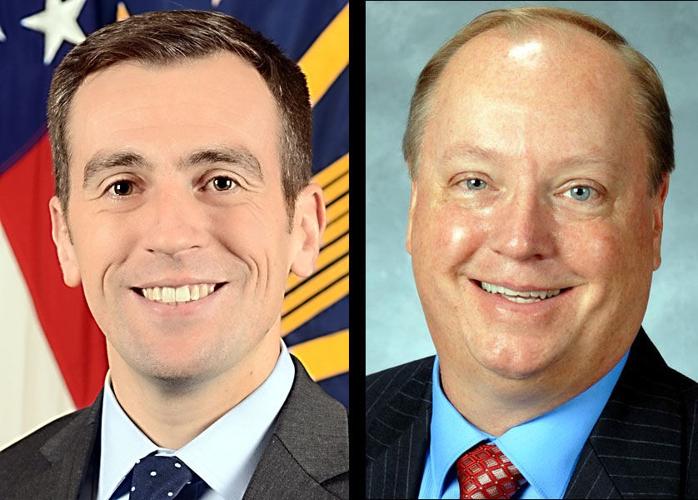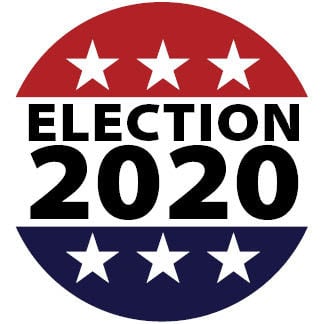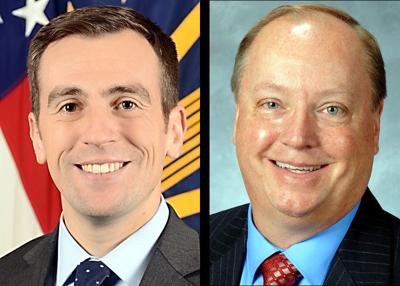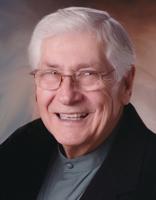MANKATO — With just more than a week left until the Nov. 3 election, the race between Republican U.S. Rep. Jim Hagedorn and Democratic candidate Dan Feehan has ended up right where it was this time two years ago: a toss-up.
A recent Cook Political report rating lists Minnesota’s 1st Congressional District race as a toss-up, a downgrade from what many assumed would be a lean Republican advantage earlier this year. And in a potentially tight race — Hagedorn defeated Feehan in 2018 by slightly more than 1,300 votes out of about 300,000 cast — both candidates are looking to differentiate themselves not by how promising they would be in Congress but what would happen if they lost a key seat in the U.S. House.

Despite agreement on a variety of issues from infrastructure to agriculture, Feehan and Hagedorn have spent much of this year’s campaign season attacking each other as unfit to serve in Congress.
Hagedorn portrays Feehan as a carpetbagger paid to run for office, “handpicked by Nancy Pelosi,” pushing an alleged “far-left” agenda that would hurt residents across the state. Feehan portrays Hagedorn as a representative who serves special interests who allegedly used his office to enrich his friends and staffers rather than serve the people of southern Minnesota.
Hagedorn
A conservative from Blue Earth, Hagedorn is a former U.S. Department of the Treasury official who worked to get legislation passed in Congress. He’s the son of former Congressman Tom Hagedorn, who represented parts of the district in the 1970s and ‘80s.
Jim Hagedorn retired and moved back to Minnesota in 2009 and ran for then-U.S. Rep. Tim Walz’s seat in 2010, though he didn’t secure the GOP nomination.
Since then, Hagedorn ran in 2014 and 2016, where he narrowly lost to Walz by fewer than 2,600 votes. His narrow victory in 2018 represented a political shift for traditionally purple southern Minnesota, which went to President Donald Trump by a 15-point margin in 2016.
Hagedorn touts support for many of Trump’s policies, declaring in previous elections that he advocated for many of the administration’s proposals before Trump supported them. Since he was elected, Hagedorn said he’s done much to help spur southern Minnesota’s economy, health care and agriculture.
“I’ve never been shy to let people know that I’m a conservative,” Hagedorn said.
He was one of the earliest proponents of the Trump administration’s U.S.-Mexico-Canada trade agreement, which federal officials proposed in 2018 to replace the North American Free Trade Agreement. He’s also championed federal funding for rural businesses and hospitals during the COVID-19 pandemic and has proposed even more help for farmers hit by harsh losses this year.
At the same time, Hagedorn’s congressional office and campaign have been hit by several ethics-related scandals in recent months.
His congressional office was found earlier this year to have paid companies tied to his staffers or their relatives for bulk-mail correspondence, which experts say may have violated House ethics rules.
Hagedorn said he fired his chief of staff as soon as he learned of the situation and an internal investigation revealed he took appropriate action, though political watchdogs say he likely will face an investigation by the House Ethics Committee.
Hagedorn’s working relationship with a local radio DJ who worked as an advertising consultant came to light last month as media experts expressed concern over KTOE afternoon talk show host Al Travis Thielfoldt having Hagedorn on the air without disclosing the work Thielfoldt was paid to do for the Hagedorn campaign.
Though experts say there’s nothing illegal about the relationship as long as Hagedorn never paid for interview time on the radio, Thielfoldt’s invoices to the campaign may trigger a Federal Communications Commission inquiry into the relationship and into KTOE’s business practices as Thielfoldt listed radio interview times as part of his monthly invoices.
Thielfoldt dismissed potential payola concerns earlier this month and said the invoices contained reports of when he knew Hagedorn was on the radio that month, along with Google searches for other articles and TV appearances Hagedorn made.
Hagedorn’s campaign has said the congressman never paid for interview time, and he denied ever paying anyone to come on the radio.
“I’m a sitting U.S. congressman, I didn’t have to pay anyone to get on the air,” he said.
In recent weeks, Hagedorn’s campaign has faced questions over whether it used office space inside the basement of the Brett’s Building in downtown Mankato for free without declaring the in-kind donation, a potential violation of federal campaign law.
An investigation published in Politico earlier this month revealed Hagedorn has used an address inside the Brett’s Building for his congressional campaigns ever since 2013. There are also pictures taken in 2018 of Hagedorn and staff inside the basement space.
Hagedorn’s campaign said in a statement it had rented a postal office box from the Brett’s Building in the past, which Hagedorn confirmed in a recent interview.
“All we had was an address,” he said. “The building owner never charged anyone to use a P.O. box.”
Hagedorn dismissed concerns over these issues and said recent reporting by The Free Press and other news outlets was biased and in some cases “disgraceful.” He accused The Free Press and other media of unfairly distorting some of these issues and claimed journalists have sided with Feehan in covering this year’s election.
Feehan said Hagedorn’s recent scandals are part of a pattern of “personal corruption,” which he said shows Hagedorn is unfit for office.
“Corruption is a matter of culture, a culture that centers on a leader,” Feehan said. “It seems like there’s a long trend of it that’s only coming to light because taxpayer dollars are now involved in it too.”
Feehan
Feehan is a U.S. Army veteran and a former National Guard captain who was a teacher in Illinois and Indiana for several years before he was tapped to work in the White House in 2013. From there, he served as a deputy assistant secretary of defense — at one point, he was acting assistant secretary of defense for readiness in President Barack Obama’s administration.
He was born in Minnesota and spent part of his childhood in Red Wing before returning to the state in recent years with his family and moving to North Mankato. He touts himself as an independent-minded moderate liberal whose focus is on public service and who is willing to criticize both political parties in Congress.
“Politics should be a place where people come first,” he said. “People are not coming first in Washington right now.”
After his defeat in 2018, he spent time touring southern Minnesota and connecting with people across the district, which he said helped build relationships and a potential coalition to help serve constituents if he’s elected.
He’s an advocate of a potential public health insurance option, but he said doesn’t support single-payer health insurance. He would like to see southern Minnesota take more of an active role in clean energy, as he claims the district is in a unique situation to potentially become the first energy-independent congressional district in the U.S.
And if Feehan is elected, he’d like to serve on the House agricultural committee just as Hagedorn does to continue to ensure southern Minnesota has a voice in federal farm policy.
At the same time, Feehan continues to face criticism over his southern Minnesota roots as conservatives charge he only moved into the district to run for office. In recent weeks, he’s also faced allegations he was paid to run for Congress by three liberal nonprofits conservatives say are fronts for Democrat supporters to skirt campaign laws.
Hagedorn first accused Feehan of being paid to run for office during a Sept. 27 debate on KEYC, where Hagedorn claims Feehan was paid almost $500,000 from 2017 through 2019 for nonexistent work.
“At one point over a nine-month period in 2019 when he was getting ready to run again, he was making $25,000 a month. What did he do to earn $25,000 a month?” Hagedorn said. “Where are the emails back and forth to show, ‘Well I’m making progress on my project?’”
Those nonprofits, from a military think-tank to an education policy group, have publicly said in recent weeks Feehan was paid properly for consulting work. Feehan has dismissed the accusations as an attempted smokescreen to hide Hagedorn’s ethical issues.
The issues
Both candidates diverge on major policy decisions that could impact southern Minnesotans, from health care to the pandemic.
On COVID-19, Feehan said he’s appalled the Trump administration hasn’t drawn up a national strategy to address the ongoing coronavirus. He frames the lack of federal leadership as a national security issue that has dire effects for the economy the longer the U.S. goes without national virus regulations.
“We’ve been too long presented with the idea that you either deal with the virus or deal with the economy,” Feehan said. “They go hand in hand.”
Feehan would like to see the U.S. provide more funding for testing, resources and personal protection equipment, among other things.
By contrast, Hagedorn said he believes the U.S. has made great strides in containing the virus through its state-based approach. He said Minnesota needs to cut back on virus regulations and follow the lead of nearby states such as South Dakota, which put fewer regulations in place.
Hagedorn points to the decrease in regular health care, such as cancer screenings, as well as the interruptions families face from changing school policy as catastrophic side effects of virus regulations.
“Everywhere I go, it’s the same thing,” he said. “These lockdowns are more hurtful to the people than having people out and about.”
On the economy, both candidates agree containing the virus is paramount to kickstarting the economy. Yet they differ in their approach to helping agriculture industries recover from losses incurred by the pandemic.
Both support more federal coronavirus aid to farmers, but Hagedorn said he believes farmers have more to look forward to as the Trump administration renegotiates trade agreements across the globe. He points to recent soybean sales to China and rising commodities prices as signs the recent tough times for farmers are ending.
“We’re finally seeing results for trade, for getting the ethanol program right, all the things we need to happen,” Hagedorn said.
Feehan, who has previously criticized the Trump administration for aggressively ending trade agreements and temporarily halting markets for agricultural goods to other countries, said he’d like to see trade agreements happen more rapidly. He’d also support more agricultural legislation to protect small farms from farm consolidation efforts by larger companies.
“The fight for anti-consolidation has to happen, it has to be better represented,” he said.
On health care, each candidate supports cutting prescription drug prices, though Feehan and Hagedorn argue their opponent’s ideas would raise health care prices rather than fix them.
Hagedorn criticizes Feehan’s public option proposal as a nightmare for rural hospitals that could be driven out of business. The Republican representative touts a health care plan that would see more interstate competition and more high-risk insurance pools to limit middle-class families from paying more to subsidize care for people with ongoing health care needs.
Feehan said Hagedorn has consistently voted against potential health care reforms and has sided with the health insurance industry. The Democrat argues a public option would force insurance companies to lower prices to compete instead of artificially inflate costs for care. Feehan said he would support higher reimbursement rates for rural hospitals to offset any potential concerns about a public health option and would support allowing Medicare or a public health option to directly negotiate prescription drug prices with pharmaceutical companies.






























Commented
Sorry, there are no recent results for popular commented articles.